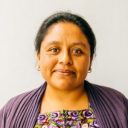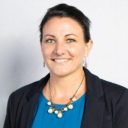This article is part of a series of articles about Community Led Philanthropy, co-hosted by GlobalGiving. The conversation explores the ways philanthropy can support community-led change.
Our organisation formed 15 years ago at the urging of community leaders who wanted to do something about the barriers to better health in rural Guatemala, including language, culture, and discrimination against Maya people. That work continues today with a staff of more than 60, most of them health workers from the Indigenous communities we serve.
While we’ve always considered ourselves community-led, we are constantly learning more about what that means and how to make it true day today. We believe that one of the most effective ways to be community-led is to listen — not only to the most vocal leaders or those with the best English but more importantly to the community members who are in the best position to see the most pressing problems and most practical solutions.
We witness the value of deep listening again and again. One example is our experience launching our diabetes program. Since day one, community members have identified diabetes as a top concern. Diabetes rates have been rising across Guatemala, posing special challenges in poor, rural communities where it can be difficult or even impossible to access treatment. In addition to helping our patients get treated and manage their conditions at home, we designed a program to get at the roots of the problem and reverse the trend. We organised educational classes tailored to local contexts and delivered them in the communities’ Mayan languages, an approach that has been effective in other areas, like women’s health.
This model of listening and encouraging communities to identify the issues of most importance and develop approaches that will work to address them is similar to the behaviour change model used to help individuals make healthy changes in their lives.
But almost no one came to the classes. So, we organised some focus groups to figure out what was going on. In these conversations, we learned that our patients with diabetes felt isolated. They explained that to create new diets and habits, they needed to have their families on board; in order to agree to these changes, the families had to understand why they were important. We pivoted to home-based interventions with families that work much better.
More recently, as part of our Family-Centered Nutrition Program, we began exploring family gardens to meet the need for more diverse and sustainable food sources. Community members liked the idea but noted a critical obstacle: piped water is a scarce resource they couldn’t afford to use on gardens. Our team went to work with community members and came up with a solution: filtering the water from kitchen sinks used for washing. It is more expensive to use the ‘grey water’ filters, but worth the extra cost because it results in a solution that works for families long-term.
This model of listening and encouraging communities to identify the issues of most importance and develop approaches that will work to address them is similar to the behaviour change model used to help individuals make healthy changes in their lives. These exchanges take more time than simply pointing out problems and prescribing solutions, but they are more likely to create lasting change because they are designed by and for the individuals and communities and are viable in the context of their realities. Community members not only have a handle on practical matters like access to water; they bring a nuanced understanding of underlying considerations like the trauma and mistrust that lingers from Guatemala’s deadly 36-year civil war.
In our work with Mayan communities, especially with women, we’ve found that to listen well, we also need to intentionally centre historically disenfranchised people; to see and cultivate their knowledge and make sure they are comfortable speaking and feel heard. We focus heavily on employing women and encouraging them to seek leadership roles. We pay them fairly for their time and expertise. We offer training to help them stick up for themselves, voice their opinions, and lead conversations. This in turn inspires others. Hearing and seeing women with power and agency helps push back on machismo and other damaging practices, with transformative effects on families and communities.
It’s easy to agree on community-led change in concept. Following the lead of the people with the best understanding of the problem and potential solutions just makes sense. But making it a reality — truly shifting access to resources and relationships, dismantling harmful dynamics, and reframing definitions of expertise and success — requires the time, patience, and humility to authentically listen to and hear what may be the softest but also the wisest voices in the community.
This article is part of a series produced with GlobalGiving to explore community-led philanthropy. For more, visit alliancemagazine.org/community-led-philanthropy.
Waleska López Canu is Medical Director at Maya Health Alliance | Wuqu’ Kawoq, and Anne Kraemer is Executive Director at Maya Health Alliance | Wuqu’ Kawoq.







Comments (1)
the work done by Anne Kraemer Executive Director of Maya Health Alliance | Wuqu 'Kawoq is incredible and so professional, his team has worked for many years in many communities of the country in indigenous communities, sharing nutrition and health programs, focused on the family and seeing this type of article, it is! wooow !! Because, she is a woman who dedicated herself to her skin for work, and for the love of the country and the Mayan communities, which are the ones who have little or no access to Health and she and her team have provided it, very much congratulations! ! Maya Health Alliance | Wuqu 'Kawoq and great work.